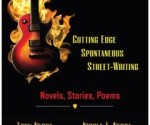James Franco discusses his film Child of God
 Child of God directed and written by James Franco and screened at the New York Film Festival this year, is an uncompromising excursion into American Gothic. Adapted from Cormac McCarthy’s 1973 novel, the story is about an unstable sociopath in early 1960’s rural Tennessee who descends into an animal-like state. I agree with the festival programmers when they said not for the fainthearted. Franco does an excellent job directing this movie.
Child of God directed and written by James Franco and screened at the New York Film Festival this year, is an uncompromising excursion into American Gothic. Adapted from Cormac McCarthy’s 1973 novel, the story is about an unstable sociopath in early 1960’s rural Tennessee who descends into an animal-like state. I agree with the festival programmers when they said not for the fainthearted. Franco does an excellent job directing this movie.
How did you find this story?
I first read the book seven years ago at a class at UCLA when I went back to finish my B.A . I took a class on McCarthy, so we basically read all of his stories, but there were a few that really stood out. Like this one — Child of God. I’ve heard a lot of people talk about this like Spielberg, that when you come across something that interests you or inspires you those are the reasons you really need to make a movie, but actually you don’t really need reasons. You can explore it through the creative process. So I guess when I read this, the hairs on the back of my neck were tingling — here’s a person who cannot fit into society. That interests me. I deal with characters that are isolated or have a rich imagination. I knew it was a very dark book, there was something in there and having thought about it and thinking about making it — what it really is, in addition to the great writing and the way the book was structured and the usual character portrait, there was a way to talk about things that are universal.
So your goal is to find something for everyone to relate to even if the character is unusual?
I like to look at someone who is not able to fit into society. He wants it so bad. It’s an extreme way of showing this want for a connection with another person, another someone outside ourselves. The need to love and be loved.
You seem to do everything?
Yes, I make all kinds of movies and I direct and act. I question how we interest each other. I am in the unique position of being on the commercial side of the business, but I also have many interests so I can bring all these worlds together. Look for your artistic voice. Find something you can do that others cannot. I appreciate structure, not anarchy.
So this movie touches on the subject of necrophilia?
It’s a movie about that, but told in a very estranged and unusual way. Necrophilia, it’s true that I do have a fascination with it. I’m not condoning it, just using it as a way and example. I deal with characters that are isolated or have a rich imagination. In my personal life it’s of no interest. As a filmmaker I thought that was, well, all the reasons I wanted to make this. To makes movies, you need to make something new, but also something people can relate to.
You seem to be able to translate books to film really well in particular with very sensitive subjects?
I examine what it is like to be human, a universal connection with one another — I decided to tell it through necrophilia. I’ve done this with a few books now. I use poetry, it’s always the question of how loyal will you be to the source and then in what ways will you be loyal. Our focus was, yes, we love the book and we want to translate it to the screen and honor the source as much as we can. Every scene in the movie you could find in the book. It’s about how loyal you can be to the book and the translation of it. The stuffed animals he talks to, they take on roles of their own in the film. They take on their own characters. The scene where he shoots the stuffed animals I added in and it’s my favorite scene. During the filming I thought we needed closure with these characters (stuffed animals).
So you use this to connect the man’s thoughts with how the audience can become part of them?
Yes, his actions would also be a great way to show the main character coming unhinged. It’s a way for him to externalize his feelings. Essentially it seemed to me the whole idea of the book was telling the story.
Violence seems to be another theme?
The same theme is in lots of his books, the recurrence of violence. Violence, there is something inherently violent about humans. He layers his books with violence but also places of violence in history. He goes to a mental institute and meets someone more mental.To me it was a way to tell you a story of this one crazy guy but it does not stop with him being mentally ill. It was a poetic ending to the movie. He’s gone through all this and his spirit is still out there.
So this subject of necrophilia you had thought through on another movie you did?
When I was at NYU I wrote a short about men that live in a morgue and have friendships with all the bodies. It’s not necrophilia but its communing with the dead. And I think for me I have not been attracted to this in my personal life. I’m not attracted to dead people. What it is that I look at, in some of the other projects I directed, are characters that are. They have a very rich imagination about their lives. With Hart Crane, he was isolated and his work did not fit with the work of the day or the writers of the day, so he was isolated that way. In this case you could see it blooming into poetry. I see this main character Lester the same way. Maybe he’s not an artist. He’s a stand in for someone who stands for someone who cannot fit into civilization. But he wants attention with another so when he stumbles on this opportunity, he figures out how he can have a relationship outside and he animates it with some imagination. For me, necrophilia is an extreme way to talk about things that we all want, connection with another. It’s an extreme way to show someone living in their own imaginary world.
You like to take things to extremes.
Yes, in extreme ways sometimes, I guess I do. I am interested in the familiar and unfamiliar like in Lolita. The main character is a monster inside but the feelings on the inside are deep feelings of love. Lolita you could say shares the same kind of love in a relationship we don’t condone. So it’s an extreme way to examine universal feelings.










